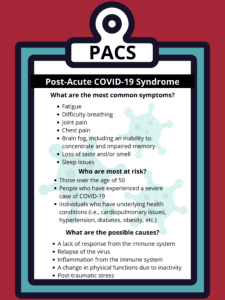Post-Acute COVID-19 Syndrome (PACS)
As the COVID-19 virus is spreading rapidly throughout the world, much remains unclear and unpredictable when it comes to the long-term consequences. There has been some research and statistics done when patients with COVID-19 have been discharged from the hospital. A significant number of patients with COVID continue to experience symptoms many weeks after contracting the virus. In this blog, we will inform you of what we know about Post-Acute COVID-19 Syndrome (PACS).

What is Post-Acute COVID-19 Syndrome (PACS)?
People usually think that after having COVID-19 you will go back to your normal activities of daily life, however, there are individuals out there who have a different experience. They have symptoms that can last for weeks or months on end. Post-Acute COVID-19 Syndrome, known as ‘PACS’ and/or ‘Long COVID’, is a condition where people who have recovered from the acute virus syndrome continue to experience symptoms for weeks and months after the initial acute infection.
Cohort Study on PACS
https://www.ncbi.nlm.nih.gov/pmc/articles/PMC7833295/
Findings/results →
- A total of 2469 patients with COVID-19 were discharged from Jin Yin-tan Hospital between Jan 7, and May 29, 2020 (the follow-up study was done from June 16, 2020, to Sept 3, 2020.)
- 33 (1·3%) of the 2469 patients died after discharge mainly due to exacerbation of underlying pulmonary, heart, and kidney disease.
- 25 patients were readmitted to the hospital for underlying disease complications when contacted by telephone for follow-up, with one of them admitted for respiratory failure caused by underlying pulmonary fibrosis.
- 3 patients developed ischaemic strokes, and 1 patient had an acute pulmonary embolism due to deep venous thrombosis of lower limbs after discharge.
- After discharge, most of the patients experienced at least one symptom (i.e., fatigue/muscle weakness, sleep difficulties, anxiety, depression)
- The patients who were on the severe side of the spectrum had an increased risk of a pulmonary abnormality, fatigue/muscle weakness, and anxiety or depression.
Why is this important to know?
As mentioned above, the most common symptoms that come from PACS are fatigue, brain fog, difficulty breathing, chest pain, and muscle aches. If an individual has any of these symptoms, it is important to know what you can use to help to heal the symptoms. If you are having symptoms of fatigue, there are many multivitamin and mineral supplements that may help: Vitamins B1, B2, B3, B5, B6, B12, vitamin C, etc. If you experience brain fog, omega 3 supplements can be very beneficial. Lastly, as for muscle aches, micronutrients that are needed for normal muscle function include magnesium, potassium, calcium, and vitamin D.
Although not much is known about how COVID-19 affects a person over time, it is important to be aware of PACS and not to take it lightly. Even if you had mild symptoms initially, you can still experience long-lasting consequences. It is essential to understand the effects of long covid as it can possibly take a toll on your overall health.
Resources:
https://www.medicalnewstoday.com/articles/long-covid#causes
https://www.healthspan.co.uk/advice/long-covid-diet-and-lifestyle-changes-that-can-help
